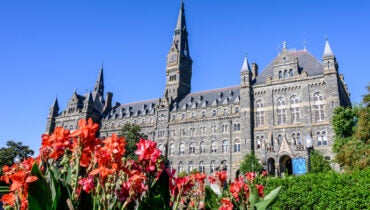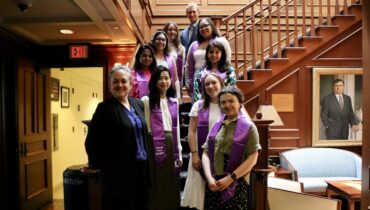This fall, Georgetown University offers a variety of graduate courses that leverage a gender lens to explore some of the most pressing global issues. There are also a number of undergraduate classes that address issues of diversity, equity and inclusion. Use this list as a resource for making your fall course selections.
Fall 2024 Graduate Courses with a Gender Lens
These graduate classes count towards credit requirements for the Georgetown Institute for Women, Peace and Security (GIWPS) Graduate Certificate in Gender, Peace and Security.
Gender, International Security and Development (MSFS-5600; CRN:40002)
Professor: S. Ayse Kadayifci-Orellana
Time: Monday, 2:00 p.m. – 4:30 p.m.
This class contextualizes gender issues and asks the question: how would we think about international peace, security, development approaches, and design intervention strategies if gender was treated a central consideration in international affairs and peacebuilding programming? To answer this question, the class will explore both conceptual considerations related to gender and its practical application. This is a required course for the Gender, Peace and Security certificate.
Gender and Security Toolbox (GOVT-5636, CRN: 38894; MSFS-7610, CRN: 38227)
Professor: Aapta Garg
Time: Tuesday, 5:00 p.m. – 7:30 p.m.
This advanced seminar will teach you concrete skills for ensuring gender is considered in peacebuilding, security, and development fields. The course will explore critical skills – from gender mainstreaming and gender analysis to gender-sensitive budgeting, research, monitoring & evaluation, and advocacy. The course will enable students to capably serve as gender focal points and learn how practitioners have successfully advanced gender in their diplomacy, development, and defense work. This is a required course for the Gender, Peace and Security certificate.
(En)gendered Security (SEST-6639; CRN: 40391)
Professor: Mariya Y. Omelicheva
Time: Wednesday, 6:30 p.m. – 9:00 p.m.
This course is designed to illuminate the multiple and complex intersections of women, peace, and security that are recognized as well as omitted in national and international legislation, policies, and practice. The course advances and critically assesses three related themes. First, gender is conceptually and theoretically necessary to thinking about security itself and central questions of security, to include war, conflict, and peace. Second, gender is indispensable to explaining the complex cause and effect relationships over a range of security issues. And, third, gender is important from the policy standpoint for devising sustainable and effective approaches for making the world a more secure place for everyone regardless of their social identity.
Forgotten Women in Mass Crimes (SEST 6638; CRN: 44348)
Professors: Patrick Desbois, Andrej Umansky
Time: Thursday, 6:30 p.m. – 9:00 p.m.
Why is violence against women and girls are so frequently forgotten or “silenced” in mass crimes and genocide? Why are acts of violence against women and girls so frequently obliterated from the Holocaust narrative, the Roma genocide narrative, and Guatemala’s mass violence history? From ISIS’ terrorist narrative before the courts of law? From news emerging from Ukraine? Do ground investigations have the capacity to reveal the crimes against women, or are they choosing not to? Students will learn how to conduct forensic investigations of violence against women in the scope of genocide and mass crimes and learn from field investigations of Fr. Patrick Desbois and his team.
Gender and Migration in Europe (GEST-5402; CRN: 38457)
Professor: Joyce Mushaben
Time: Tuesday, 12:30 p.m. – 3:00 p.m.
This course analyzes a complicated web of labor migration patterns, refugee flows, family unification trends, asylum policies and human-trafficking challenges intricately connected to globalized production and consumption chains. It addresses the “securitization” of border controls introduced in the wake of the 2015 refugee crisis, relegating women’s rights as human rights to the back burner in violation of the EU gender acquis.
Gender and Sexuality in South Asia (ASST-4045; CRN: 41654)
Professor: Cecilia Van Hollen
Time: Tuesday, 2:00 p.m. – 4:30 p.m.
This course provides students with an introduction to anthropological approaches to the study of gender and sexuality in South Asia through ethnographic books, articles and documentaries. We will explore how cultural ideas about gender and sexuality are constructed, maintained, and challenged in the South Asian context, keeping in mind South Asia’s global connections from the colonial period to the present. Key topics of the course include the intersections of gender/sexuality, work, and migration; gender, class and caste; LGBTQ+ identities and activism; gender/sexuality and nationalism; gender/sexuality and religion; gender/sexuality, politics and law; and gender, health and the body.
Gender & Terrorism (SEST 6544; CRN: 46058)
Professor: Devorah Margolin
Time: Tuesday, 5:00 p.m. – 7:30 p.m.
Women have often been overlooked and understudied within violent extremist movements. From Sri Lanka’s Tamil Tigers to Chechnya’s Black Widows to the Al Khansaa Brigade of ISIS, women have played critical roles in terrorist organizations across the globe for decades. As men often take on more prominent and violent roles within terrorist groups, women’s contributions to violent extremism can often be underplayed, underexplored, and misunderstood. From theoretical foundations to policy implications, this course will address pressing terrorism threats to national and international security with an often overlooked gender lens.
Hunter(M)/Gatherer(F) & National Security (SEST-6700; CRN: 41885)
Professor: Gina Bennett
Time: Thursday, 5:30 p.m. – 9:00 p.m.
This course will examine the reasoning behind the evolution of today’s national and international security from its “Man the Hunter” origins by surveying the biological, psychological, anthropological, and cultural explanations for how we define security, dominance, and power. Students will also get an opportunity to consider and create national-level strategy based on a spectrum of “hunter-gatherer” understanding of security.
Indigenous Peoples of the Americas and Power-Based Violence (GOVT 5668; CRN: 42493)
Professor: Veronica Quinonez
Time: Thursday, 5:00 p.m. – 7:30 p.m.
This course will examine various forms of power-based violence including intimate partner violence, stalking, and sexual violence as it impacts Indigenous Americans. We will review theories about frequency and prevalence of power based violence in Indigenous communities of the Americas and larger historical contributors to violence against Indigenous Americans. We will later evaluate current systems and policies that exist in relation to power based violence and how these institutions can help or hinder Indigenous survivors. The course culminates in a final project where students are asked to analyze an existing Indigenous-led program, policy, law, etc rooted in violence prevention or intervention.
The following classes also count towards the Gender, Peace and Security Certificate—but are currently full. However, if you are interested in taking this course, we encourage you to enroll on the waitlist.
Women & Gender in the Arab World (ARST-6532; CRN: 45453)
Professor: Fida Adely
Time: Thursday, 3:30 p.m. – 6:00 p.m.
Possibly no issue related to the Arab world has garnered more attention than the status of women. This course will situate current preoccupations with women in the Arab world in historical and comparative perspective, and within broader theoretical debates about gender and sexuality. Drawing on a variety of disciplines, we will consider the ways in which class, ethnicity, geography, religion, and culture shape the status, experiences, and desires of women in the region.
Fall 2024 Undergraduate Courses that address Diversity, Equity & Inclusion
In addition to graduate courses, the university also offers a large variety of undergraduate classes engaging with gender and other diversity, equity, and inclusion (DEI) topics. For undergraduate students who are interested in learning about how gender, race, class, religion, and other identities intersect with the world around them – we recommend these classes as a starting point, though Georgetown offers many wonderful options.
- Black Digital Feminisms, Professor Brienne Adams (CRN: 43566)
- Gender and Economic Development, Professor Lamis Kattan (CRN: 44137)
- Gender and Migration in Europe, Professor Joyce Mushaben (CRN: 38457)
- White Supremacy in International Relations, Professor Desha Girod (CRN: 43597)
- Women, Peace and Security, Professor S. Ayse Kadayifci-Orellana (CRN: 38818)
- Bodies, Technology & Violence, Professor Katherine Chandler (CRN: 35968)
- Religion in Conflict & Peacebuilding, Professor Sheherazade Jafari (CRN: 43470)
- Population, Gender & Environment, Professor Patricia Biermayr-Jenzano (CRN: 34438)
- Violence/Gender/Human Rights, Professor You-me Park (CRN: 18359)
- Routes, Black Internationalism, Professor Dayo Gore (CRN: 43574)
- Immigration & Conflict, Professor Gregory Brown (CRN: 28759)
- Migration & Human Rights, Professor Ahmed Elobaid (CRN: 43831)
- Faith, Race and Politics, Professor James Wallis (CRN: 43893)
- Gender & Sexuality in South Asia, Professor Cecilia Van Hollen (CRN: 41654)
- Women & Gender in the Middle East, Professor Nadya Sbaiti (CRN: 44087)
- Gender & Feminism, Professor Alisa Carse (CRN: 36064)
- Feminist Disability Studies, Professor Lydia Brown (CRN: 34437)
- Gender, Race, and Feminism, Professor Emerald Christopher (CRN: 36400)
- Challenging Pride: Bias/LGBTQ, Professor Amena Johnson (CRN: 41894)
- Gender, Race & Incarceration, Professor Emily Hainze (CRN: 43646)
- Disciplining the Poor, Professor Rosemary Ndubuizu (CRN: 41832)
- Exploring Race and Diversity, Professor Liliana Duica Amaya (CRN: 44793)
- Place, Race, & Educational Reform, Professor Nardos Ghebreab (CRN: 43910)
- Disability Justice Equity & Politics, Professor Dara Baldwim (CRN: 42594)
- Black Women & Politics of Care, Professor Melanie White (CRN: 43538)
- Nationalism/Identity in the Gulf, Professor Zarqa Parvez (CRN: 44433)
- Migration & Citizenship, Professor Amanda Garrett (CRN: 44149)


